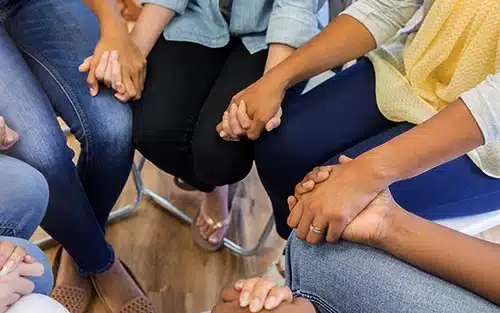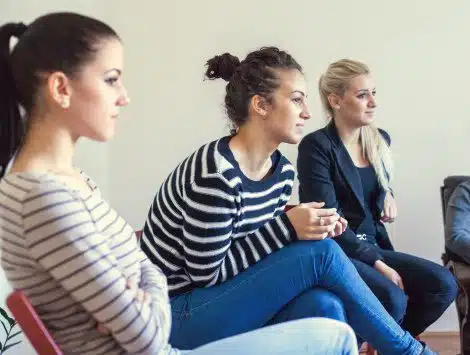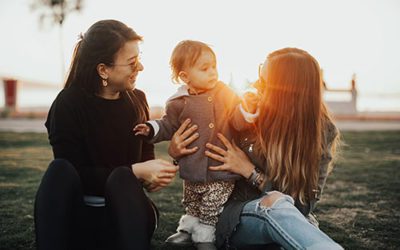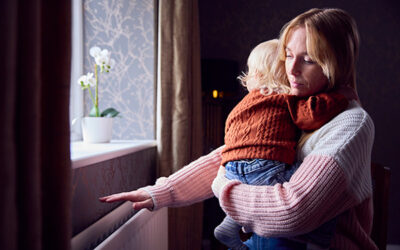
You don’t need to have a “problem” to join a support group. Every birth mother can benefit from a community that celebrates her strength and selflessness, no matter the individual circumstances. The stories and advice you hear from other birth mothers could be valuable tools. Furthermore, you can learn how to navigate your growing relationship with your adoptive family.
Be Wary of Toxic Spaces
However, people are not perfect, so there’s something to be cautious of when searching for a birth mother support group. Women who placed a baby prior to 1980 may have totally different needs for support. Support groups filled with women from that era may feel negative about adoption in general. They may continue to experience hurt around their own adoption experience. These women may not understand or appreciate today’s modern, open adoption.
Similarly, a group focused on open adoption may feel completely foreign to a woman who has only known closed adoption. The updates and visits that bring these women peace simply don’t exist for birth mothers of the closed adoption era. Identifying a support group that had the same choices (open vs. closed) in adoption may be a good place to start.
A Real Birth Mother Experience
Kiesha, a Lifetime birth mother, shares her experience with a toxic birth mother support group.
I got totally bullied in one group. All these people basically said to me, “No one wants to hear about your perfect adoption and how great your adoptive parents are when we’re all suffering. You are three months in, and you think you know everything about adoption. Just wait, it’s only a matter of time before they shut the door in your face.” One lady tried to compare my adoption to her closed adoption experience from 40 years ago! That was hard, and I shouldn’t be made to feel ashamed for choosing what is best for my son.
Negativity Breeds Negativity
When people are hurting, they might want to validate those feelings by surrounding themselves with people who share a common outlook. Seeing a successful adoption story may make them feel deficient somehow. Sometimes that shame turns into the anger and jealousy they project onto others. They have a lot more healing to do, and it has absolutely nothing to do with you.
No support group is perfect, so you could find one or two people like this in any group. However, if this vibe overtakes the entire group, you should remove yourself from this toxic environment. You won’t get the support and healing you are looking for from a group with this energy. Fortunately, there are many avenues you can take to find the support group that is right for you.
Finding the Birth Mother Support Group That’s Right for You
Thanks to the Internet, birth mother support groups are available in several different forums and are easier to find than ever. Search your heart and decide what you need and what you are willing to give to a support group. Here are some questions to help lead you to the right group:
1. How much support am I looking for?
If you are looking for an active group, consider finding a local support group that holds regular, face-to-face meetings. There are also birth mother retreats that are organized across the country. These events can last several days and provide you with a powerful opportunity to bond with your peers.
If you’re not comfortable with face-to-face meetings, or if you only want support as questions arise, an online support group may be able to fulfill your needs. Choose your preferred social media account, and search for “birth mother” in groups. Once you join, you decide how often you wish to post or respond to others.
Again, be wary of toxic spaces if your online group is not well-monitored. If social media is causing you more stress than peace, step away.
2. How much time do I have to devote to a support group?
Online support groups are the quickest and easiest to join. If you have the time, flexibility, and desire to do the deeper dive, a local group that meets regularly will provide you with the opportunity to give support as well as receive it.
3. Am I looking for a specific group?
Maybe you only want to connect with people who are in open adoption plans or those who are generally happy with their adoption journey. Or, you might be looking for a group of birth mothers who placed their child with an adoptive family of another race. You might not find a local group that caters to your specific preferences, so an online forum may be the way to go.
There’s nothing wrong with shopping around to find the right support group. This is your journey of healing, and only you know what will work best for your self-care. With some patience and persistence, you will find the community you need as Keisha did:
But through the group, I found others like me who have good relationships with their adoptive parents with positive outlooks on adoption. I’ve connected with other birth moms locally and across the country, and that really helps.
I think it’s like the Internet – sometimes you only hear the bad stuff, and some people are negative no matter what. I’m confident in my decision. I make sure to tell my son’s adoptive parents how much I appreciate them letting me see him, especially after hearing some of those stories.
Online resources like BraveLove have information on birth mother support groups and retreats, broken down by state. Your Lifetime Adoption coordinator is also an excellent resource who is here to support you even after you have placed your baby for adoption.
Reach out to your coordinator to learn about our peer support program, where we connect birth mothers with peer counselors.
Mardie Caldwell, C.O.A.P., is nationally recognized as an expert on open adoption. A Certified Open Adoption Practitioner (C.O.A.P.), Caldwell is the founder of Lifetime Adoption Center, established in 1986. She has assisted in over 2,000 successful adoptions and was one of the first adoption professionals on the Internet.
Caldwell's life work is dedicated to educating and helping birth parents find the right adoptive parents for their child. She spreads the word about modern adoption through speaking appearances, webinars, online resources, and as a podcast show host.
She has written several award-winning books, including So I Was Thinking About Adoption, the first book of its kind. There are many reasons women choose adoption, and this short book is a comprehensive resource to make the best plan for you and your baby. Caldwell wrote So I Was Thinking About Adoption as a handy guide to the details of the adoption process.
Caldwell has made over 150 media appearances, including ABC News, CBS News, Larry King Live, CNN Headline News, NBC's The Today Show, CNN's The Campbell Brown Show, NBC News, KGO Newstalk Radio, CNN's Black in America II, MSNBC, Fox, PBS, BBC, and Dr. Laura.






I am looking for a birth mother group that might be older, later in life, beyond the acute intensity of the adoption process. At least, that’s what I think now. To be honest, it never occurred to be that such a group might exist. Shrouded in shame, I could not imagine thinking we would ever be “seen,” much less, connected.
Anyway, I live in San Jose California. I am 62 years old. The baby was born when I was 13. Keeping him was not an option. I’ve been alone in this silence for a long, long time. So please understand: I just want to start with a connection, virtual or otherwise as I start this journey of being seen.
Hello Monica, thank you for sharing your story! Visiting the organization Birthmom Buds is a great place to start. They can be found online at BirthmomBuds.com.
I just found the book The Girls Who Went Away by Ann Fessler, about birth mothers pre-1973, and read the first 140 pages yesterday, and for the first time in over 50 years felt that I wasn’t alone, that I have a whole community of women who can understand.
So today I looked to the web to help me find them. Can you imagine my shock and dismay when the first site I found (yours) said this?
“The energy from some birth mothers who have had a negative adoption experience can put a cloud over the entire group. Instead of providing support and understanding, they want to bring others down to their level. This creates a toxic environment, and it isn’t helpful to anyone.
I got totally bullied in one group. One lady tried to compare my adoption to her closed adoption experience from 40 years ago! “
Why the need for the judgmental stance and name-calling? Could you not have simply made clear that different kinds of experiences lead to different needs from support groups, and one should pick a group that is made up of women with similar experiences?
Hi MJ,
Yes, birth mothers who placed a child before open adoption have a completely different experience, one often filled with heartbreak because adoption was rarely their choice. Many times, just as the book you reference details, they were sent away to have their babies elsewhere, so they could come back where they were expected to pick up their lives like nothing every happened. I am thankful that we have learned from that.
The challenge that many support groups have is blending women who have very different experiences wrapped around the same topic. Women who have open adoptions, can’t understand or identify with women who were essentially forced to do adoption, because often in their experience with modern adoption, they were getting pressure to parent from friends and family. Similarly, the ongoing contact can be something that becomes a debate, rather than just a choice. And most starkly in contrast is often wrapped around the support needed, which can be very different in a modern open adoption versus a closed adoption.
In fact, in writing this article, I had in mind a few different support groups that I am personally aware of that are not necessarily support groups, but more anti-adoption groups based on shared experiences of closed adoption. I can see how the quote you shared can be seen differently than I intended it. I will ensure that I correct it to my original intent.
I wish you all the best as you seek to find community and support for your experience, and would welcome future input if you’d like to share your story.
Does anyone know of support groups for a birth mother & her 50 year old daughter who reunited in the Philadelphia area?
Hi Laurie,
The adoption organization BraveLove for birth mothers provides a list of support groups by state at: BraveLove.org/post_adoption_support
Two other places to look are BirthMom Buds, a faith-based organization that provides support to birth mothers, and On Your Feet Foundation, which provides post-placement resources to birth parents.
I’m a birthmother. My son will be 9 in June. I did a adoption plan for him. I’d like to join a support group for birthmothers near me or maybe start one. Any info will be greatly appreciated. Thank you
Hi Jill! Thanks for reaching out. Online resources like BraveLove have information on birth mother support groups and retreats, broken down by state.